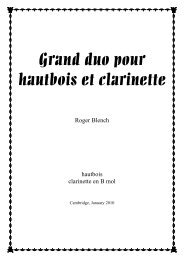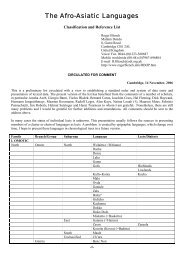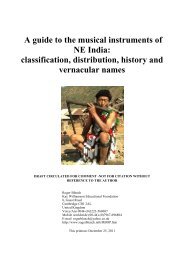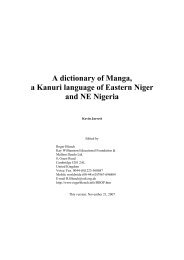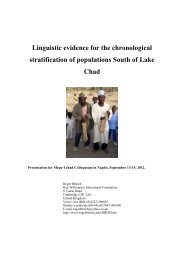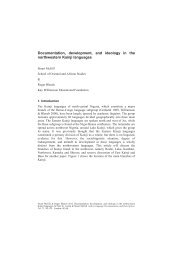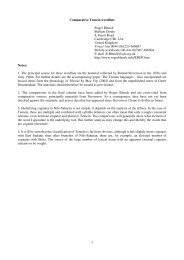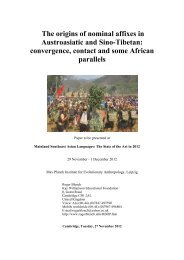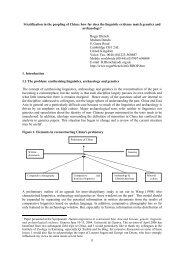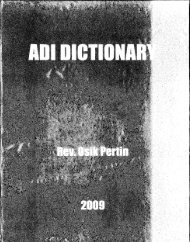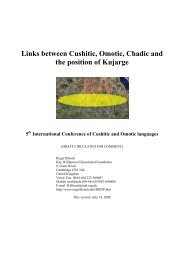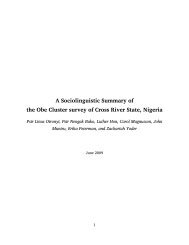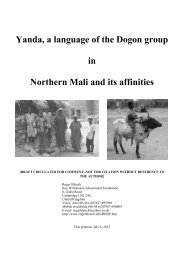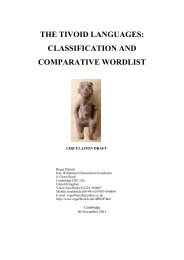You also want an ePaper? Increase the reach of your titles
YUMPU automatically turns print PDFs into web optimized ePapers that Google loves.
proverbs, riddles and a story Iwe owe, alo̩ ati itan aroso̩ ni ede Ikann By <strong>Fred</strong> <strong>Adekanye</strong> and Sophie Salffner (eds.) Ikann<br />
o̩wo̩ <strong>Fred</strong> <strong>Adekanye</strong> ati Sophie Salffner Lati<br />
<strong>Fred</strong> <strong>Adekanye</strong> and Sophie Salffner (eds) 1<br />
March 2007 Ikakumo-Aworo,
– AKOONU Preface O̩ro̩ Ako̩so̩...........................................................................3 Acknowledgements Idupe̩................................................................5 CONTENTS<br />
– Awo̩n Alabaasis̩e̩po̩.....................................................6<br />
ABC For Ikann – Abidi ti Ikann...................................................9 Proverbs – Owe..................................................................................15 Riddles – Alo̩.....................................................................................24 An Ikann Story – Itan aroso̩ ni ede Ikann.........................................32 Contributors<br />
Ikann proverbs, riddles and a story<br />
2
This booklet is a collection of<br />
proverbs, riddles and stories of<br />
the Akann people in Ikakumo-<br />
Aworo, Akoko North-East Local<br />
Government Area, Ondo State,<br />
Nigeria.<br />
The Akann speak Ikann language,<br />
a dialect of what is known as<br />
“Ukaan” among linguists. Akann<br />
people can also speak Yoruba and<br />
many of them also speak Ebira<br />
but their own Ikann language is<br />
quite different from Yoruba or<br />
Ebira. Many of the young people<br />
in Ikakumo still understand Ikann<br />
but they find it difficult to speak<br />
PREFACE – O̩RO̩ AKO̩SO̩<br />
Ikann properly and can’t<br />
remember stories very well. This<br />
means that there is a danger that<br />
the language might disappear<br />
within the next one or two<br />
generations, leaving the Akann<br />
without a language of their own.<br />
Because the language might<br />
disappear soon linguists have<br />
started to collect data and to<br />
document and describe Ikann<br />
language while there are still<br />
speakers around who know Ikann<br />
well.<br />
This booklet is part of this effort.<br />
It has been written for and by the<br />
Akann people and contains a<br />
number of proverbs, riddles and<br />
pelebe yii je̩ akojo̩po̩ owe, alo̩ ati itan aroso̩ ti awo̩n Akann ti wo̩n n gbe ni Ikakumo̩-Aworo, ni Akoko North-East Local Government ni ipinle̩ Ondo ni ilu Nigeria. Iwe<br />
awo̩n Akann a Ikann. Eyii je̩ e̩ka ninu<br />
ti awo̩n onimo̩-ede n pe ‘Ukaan’. Awo̩n ara Akann gbo̩<br />
Yoruba, o̩po̩lo̩po̩ ninu wo̩n si le so̩ Igbira s̩ugbo̩n wo̩n yato̩ Ede<br />
si Yoruba tabi Igbira. O̩po̩lo̩po̩ awo̩n o̩do̩ ni ilu naa ni<br />
gbo̩ ede Ikann s̩ugbo̩n ti o s̩oro fun lati so̩ ja gaara;<br />
ko si ranti awo̩n itan aroso̩ ni naa. Eyi tumo̩ si pe afaimo̩ gedegede<br />
ede ma lo̩ di awaari laarin<br />
agbaye. Nitori eyi, awo̩n onimo̩-ede to be̩re̩ is̩e̩ iwadii, akojo̩po̩ ede yii ati is̩apejuwe bi a s̩e n so̩ ede naa nisinyi ti a anfani pe awo̩n o ki<br />
so̩ ede naa daradara s̩i wa laye. Iwe pelebe yii je̩ akitiyan yii. A ko̩ fun awo̩n Akann pe̩lu ifo̩wo̩sowo̩po̩ wo̩n; lara ohun ti a maa ri ninu iwe yii ni owe bii meloo kan, alo̩ ati awo̩n itan le<br />
ni ede Ikann eyi ti awo̩n Akann so̩ ti a si gba sile̩ ni os̩u November ati December o̩dun aroso̩<br />
<strong>Fred</strong> <strong>Adekanye</strong> and Sophie Salffner (eds) 3<br />
2006.
Ikann proverbs, riddles and a story<br />
stories in Ikann language as they<br />
were told by the Akann during a<br />
number of sessions in November<br />
and December 2006. The Ikann<br />
has been translated into Yoruba<br />
and English in a way to catch the<br />
meaning of an Ikann expression<br />
rather than translating it word by<br />
word. Linguists who are<br />
interested in more detailed<br />
descriptions and translations are<br />
referred to the forthcoming PhD<br />
dissertation by Sophie Salffner.<br />
Because most of the Akann in<br />
Ikakumo-Aworo do not write<br />
their language and because there<br />
is no ABC that is accepted by all<br />
Akann this booklet uses an ABC<br />
with different options for spelling<br />
Ikann. For more information on<br />
how to write Ikann language see<br />
the section An ABC for Ikann.<br />
We hope very much that you will<br />
enjoy reading this book.<br />
tumo̩ Ikann si Yoruba ati ede Ge̩e̩si ilana ti fun aaye ati gbe ironu awo̩n Akann jade lai fi igba bo̩ o̩kan ninu. Awo̩n onimo̩-ede ti o fe̩ mo̩ okodoro bi a s̩e n so̩ ede yii A<br />
yoo anfani eleyii ninu iwe a-ko̩-gba-iwe-e̩ri PhD eyi olugbo̩wo̩ keji iwe n ko̩ ti o si n lo̩na. Latari pe o̩lo̩po̩lo̩ awo̩n Akann ti o n gbe ni Ikakumo̩-Aworo ko n<br />
ede wo̩n, ati pe ko si abidi eyi ti o s̩e ite̩wo̩gba fun gbogbo wo̩n, iwe yii n abidi eyi ti o fi aaye gba sipe̩li ti o ba wo̩ fun enike̩ni. Fun ito̩niso̩na nipa bi a s̩e n ko̩ ede Ikann, koja si oju iwe yii ti o ko̩<br />
lori abidi ti Ikann. A lero o maa gbadun iwe yii. Lati o̩wo̩ awo̩n onigbo̩wo̩ iwe yii da<br />
The editors<br />
4
Akann ti o n gbe ni Ikakumo-Aworo s̩e mi l’alejo pupo̩, wo̩n gba mi to̩wo̩-te̩so̩ wo̩n si s̩e iranlo̩wo̩ ni oris̩iris̩i o̩na is̩e̩ yii. O̩pe̩ mi ko ni opin fun gbogbo iranwo̩ ti wo̩n fun mi ati Awo̩n ni lati ko̩ mi ni ede wo̩n ati fun suuru ti s̩e nigbati awo̩n ibeere mi fe̩ po̩ ju. Mo si tun dupe̩ lo̩wo̩ awo̩n e̩nibi-e̩ni<br />
gbe owo kale̩ lati gbe iwe yii jade. Oruko̩ wo̩n suuru<br />
Rausing Endangered Languages Project ati ogbe̩ni Michael Dorin. Si gbogbo awo̩n eniyan pataki yii, mo ki yin Hans<br />
Ikann pe, kakaǃ Sophie Salffner ede<br />
The Akann people of Ikakumo-<br />
Aworo have given me a<br />
tremendously warm welcome into<br />
their community and have<br />
supported my work in so many<br />
different ways. Thanks are due to<br />
all of them for helping me learn<br />
Ikann and for patiently answering<br />
my many questions.<br />
I also owe thanks to the people<br />
who have generously financed<br />
IDUPE̩ – ACKNOWLEDGEMENTS<br />
this publication: the Endangered<br />
Languages Documentation<br />
Program of the Hans Rausing<br />
Endangered Languages Project<br />
and Mr Michael Dorin. A big<br />
“Thank You” to all of them or, as<br />
the Akann would say, káká!<br />
<strong>Fred</strong> <strong>Adekanye</strong> and Sophie Salffner (eds) 5
owe ti o si so̩ itumo̩ re<br />
Ikann proverbs, riddles and a story<br />
– AWO̩N ALABAASIS̩E̩PO̩<br />
Mrs Eunice <strong>Adekanye</strong>, who told a<br />
CONTRIBUTORS<br />
proverb and explained its meaning<br />
Mrs Margaret Olusi, who told a<br />
story and riddles<br />
6<br />
Patrick Olusi, ti o awo̩n owe ti o si so̩ alo̩ apamo̩ O̩gbe̩ni<br />
Mr Patrick Olusi, who told<br />
proverbs and riddles<br />
aya <strong>Adekanye</strong>, ti o pa owe ti o si so̩ itumo̩ re̩ Eunice<br />
Prince Oyadele Obaude, who told a<br />
proverb and explained its meaning<br />
Oyadele Obaude, ti o pa O̩mo̩ba<br />
aya Olusi, ti o so̩ itan aroso̩ kan ati awo̩n alo̩ apamo̩ Margaret
Mr Festus Adedeji, who told<br />
proverbs and explained their<br />
meaning<br />
Adedeji, who told proverbs<br />
and explained their meaning<br />
Dr<br />
<strong>Fred</strong> <strong>Adekanye</strong> and Sophie Salffner (eds) 7<br />
Bale, ti o pa owe ti o si so̩ itumo̩ re̩ O̩mo̩we Francis Oyebade, ti o tumo̩ awo̩n abala ti a ko̩ ni Ge̩e̩si si Yoruba aya Caroline<br />
Mrs Caroline Bale, who told a<br />
proverb and explained its meaning<br />
Richard<br />
Adedeji, ti o pa owe ti o si so̩ itumo̩ wo̩n Festus O̩gbe̩ni<br />
Francis Oyebade, who helped<br />
with the English – Yoruba<br />
translations<br />
Richard Adedeji, ti o pa owe ti o si so̩ itumo̩ wo̩n O̩gbe̩ni
owe ati alo̩ wo̩nyi sile̩. Oun naa ni o si ko̩ eyi ti a te̩ jade si iwe yii itan,<br />
Ikann proverbs, riddles and a story<br />
Mrs Grace Bale, who told riddles<br />
Mr Ade Olusi, who told riddles<br />
aya Bale, ti o pa alo̩ apamo̩<br />
Mr <strong>Fred</strong> <strong>Adekanye</strong>, who told<br />
riddles and proverbs, explained<br />
their meaning, translated the<br />
stories, riddles and proverbs into<br />
English and Yoruba<br />
Grace<br />
Mrs Sophie Salffner, who recorded<br />
the stories, riddles and proverbs<br />
and wrote up and edited the print<br />
version<br />
Ade Olusi, ti o pa alo̩ apamo̩ O̩gbe̩ni<br />
Sophie aya Abi Ali, ti o gba awo̩n<br />
O̩gbe̩ni <strong>Fred</strong> <strong>Adekanye</strong>, ti o pa owe, alo̩ apamo̩, ti si so̩ itumo<br />
8<br />
Oun naa ni o tumo̩ awo̩n itan aroso̩, alo̩ owe lati Ikann si Ge̩e̩si ati Yoruba. wo̩n.
Because there is no official and<br />
generally accepted way of writing<br />
Ikann, this booklet is written using a<br />
trial ABC. The principles behind the<br />
writing are the following:<br />
1. Ikann should be written the way<br />
you hear it.<br />
2. Sounds that sound the same<br />
should be written the same way.<br />
3. Sounds that are different should<br />
be written in different ways.<br />
For example in Yoruba the “o” in<br />
“oko” – farm and the “ọ” in<br />
“ọkọ” – husband sound different<br />
and are therefore written<br />
differently.<br />
AN FOR IKANN – ABIDI TI IKANN<br />
4. If there is a sound where you do<br />
not have a letter and cannot<br />
borrow one from Yoruba,<br />
English or Ebira you can put two<br />
or three letters together.<br />
For example, when the Yoruba<br />
borrowed from the English ABC<br />
and couldn’t find a letter for the<br />
first sound in “gbogbo” – all,<br />
everbody, they put “g” and “b”<br />
together and now write “gb”.<br />
Many of the letters are used the way<br />
they are used to write Yoruba but<br />
there are quite a few sounds in<br />
Ikann that Yoruba does not have. A<br />
good number of Ikann speakers<br />
have put in good ideas for how<br />
these sounds can be spelled and in<br />
ko si o̩na ti fi n ede Ikann kale̩ eyi ti o fun mutumuwa, ko̩ iwe pelebe yii ni ilana abidi eyi ti fe̩ dan wo bo̩ya yoo s̩e ite̩wo̩gba fun awo̩n Akann. Latari<br />
ti elo ako̩sile̩ yii n te̩le ni eyi: 1. A gbudo Ikann ki o jo̩ bi a s̩e gbo̩ o̩. 2. jo̩ra bakan naa. Ilana<br />
Awo̩n iro ti o ba yato̩ ni a ni lati ko̩ ki o yato̩. Bi ape̩e̩re̩, ni ede Yoruba, ‘o’ ni ‘oko’ ati ‘o̩’ ni ‘o̩ko̩’ 3.<br />
sira ni iro, tori naa a si ko̩ wo̩n yato̩ sira. 4. Bi a ba ri iro kan ti a ko ni<br />
fun ti ko le ya abidi ti Yoruba, Ge̩e̩si tabi Igbira fun, a le ko abidi meji yato̩<br />
me̩ta po̩ ki o duro fun iro be̩e̩. Bi ape̩e̩re̩, nigbati Yoruba ya abidi ede Ge̩e̩si ti ko ri eyi ti maa lo fun iro ti o be̩re̩ ‘gbogbo’, wo̩n mu tabi mo̩ ‘b’ wo̩n si n ko̩ o̩ papo̩ bayii ‘gb’. O̩po̩lo̩po̩ awo̩n abidi ti a da labaa yii ni o jo̩ ti ede Yoruba, ‘g’<br />
s̩a a ri awo̩n iro kan ni Ikann ti Yoruba ko ni. O̩go̩o̩ro̩ amo̩<br />
<strong>Fred</strong> <strong>Adekanye</strong> and Sophie Salffner (eds) 9
Ikann proverbs, riddles and a story<br />
this booklet we tried to show these<br />
different ways of spelling these<br />
special sounds in Ikann that don’t<br />
exist in Yoruba or English.<br />
Therefore underneath each riddle<br />
and proverb you can see alternative<br />
spellings for some of the tricky<br />
words. We did not write down<br />
alternative spellings for the difficult<br />
words in the story because this<br />
would have made the story very<br />
cumbersome to read.<br />
Also underneath each proverb and<br />
riddle and at the end of the story<br />
there are extra lines so that you, the<br />
reader, can add your own ideas how<br />
you think these words should be<br />
spelled.<br />
Finally, it is also important to note<br />
that Ikann is a tone language where<br />
the same word can have different<br />
meaning depending on the pitch<br />
with which it is pronounced.<br />
Although the tones play a very<br />
important role, they are not yet<br />
included in these spelling<br />
suggestions and we need to discuss<br />
whether or not an Ikann ABC<br />
should mark tone, and, if yes, how<br />
this is to be done.<br />
We hope that at a later point all the<br />
Ikann speakers that are interested in<br />
writing Ikann can meet up, discuss<br />
the different ways of spelling and<br />
decide together on an ABC for<br />
writing Ikann.<br />
Akann ni wo̩n ti dabaa a s̩e le ko̩ awo̩n iro be̩e̩ sile̩. Ninu iwe pelebe yii, a gbiyanju ati fi gbogbo o̩na ti fi le ko̩ awo̩n iro yii han.<br />
ni lati te̩numo̩ pe Ikann je̩<br />
alohun eyi o̩ro̩ le ni itumo o̩to̩o̩to̩ latari ohun ori o̩ro̩ be̩e̩. Amo̩ s̩aa, a ko tii dabaa bo̩ya ikann ni lati lo o ni sipe̩li abi be̩e̩ ko̩. A lati jiroro papo̩ lori o̩ro̩ yii. ede<br />
fi aaye sile labe̩ owe, alo̩ ati itan ko̩o̩kan (ni opin itan) fun<br />
onkawe yii lati ko̩ aba<br />
kale̩ nipa bi a s̩e le ko̩ awo̩n o̩ro̩ wo̩nyi. A ni i lo̩kan pe lo̩jo̩ kan gbogbo awo̩n ti A<br />
n so̩ ede si ife̩ si ati ko̩ Ikann kale̩ le pade lati jiroro lori abidi ti yoo s̩e ite̩wo̩gba fun gbogbo Akaan. Ate̩ ti o wa nisale̩ yii ni akojo̩po̩ awo̩n aba ti wo̩n ti fun<br />
nipa bi a s̩e le ko̩ Ikann sile̩. Eyi ti a ko̩ ti o sanra ju awo̩n ara yooku ni a ro pe a ni lati jiroro le lori. wa<br />
10
The table below summarises the<br />
different ideas for writing the ABC<br />
in Ikann. The sounds that the editors<br />
think will need more discussion are<br />
written in bold face.<br />
hear<br />
be big,<br />
fat<br />
stretch<br />
one’s<br />
legs<br />
ten<br />
to<br />
beans<br />
to<br />
ENGLISH<br />
p opu e̩ẁá p kp kp kpin – pi gbo̩ b b ababa e̩ẁà LETTERS SOUND<br />
to<br />
IKAAN WORDS YORUBA<br />
t turakan no̩sè̩ t sanra gba gb gb<br />
<strong>Fred</strong> <strong>Adekanye</strong> and Sophie Salffner (eds) 11<br />
enter<br />
d d o̩de̩de̩ ò̩dè̩dè̩ veranda<br />
my name<br />
chicken<br />
house<br />
to<br />
school<br />
town<br />
g egu f f fidi wo̩lé s s iskuu ilé-ìwe k k<br />
I<br />
e̩ko̩ko̩<br />
to<br />
adìe̩ ikash ìlú g<br />
ji s̩ s̩i sh shi dʒ joo inij – iniji – inis̩ – inis̩i – inish – inishi èmi òrúko̩<br />
s̩ sh<br />
and,<br />
ʃ<br />
to<br />
ikas̩ j<br />
m mana àti n n no̩ s̩ùbú m ríran ha h h<br />
see<br />
with<br />
fall
Ikann proverbs, riddles and a story<br />
have<br />
well<br />
IKAAN WORDS YORUBA ENGLISH n ng ŋ ikonga ikongga ko̩ǹ̀ga gbana – gbhana – gb gbh SOUND LETTERS<br />
m mgb<br />
mana – mgbana ní to<br />
run<br />
mouth<br />
lizard<br />
– oghmo e̩nu ŋm<br />
to<br />
pepper<br />
by bi bʲ ube̩ ubye̩ – ubie̩ àláǹgbá th ty ti tʲ tho – tyo – tio sare ghm<br />
room<br />
ogbo omgbo<br />
yh hʲ as̩o̩ba aho̩ba – ahyo̩ba – ayho̩ba àtà b<br />
my mi mʲ imegu – imyegu – imiegu yàrá hy h m s̩<br />
people<br />
want to<br />
pee.<br />
I<br />
anaianji anyansh aniansh aniyash1 àwo̩n ènìàn n ny ni niy y nʲ ja yenin – ja yeyin – ja ananji farm<br />
–<br />
to<br />
nyenin mo fé̩é̩<br />
he<br />
tò̩ any ãʲ ahan ahain – ahayn – ahany oko kw ku kʷ kweno kueno kó jo̩ nenin ja<br />
jʷ a yuag – a yoag – a anain<br />
– a yawag áá pè ayn ywag yw yo yu<br />
gather,<br />
to collect<br />
will<br />
call<br />
12<br />
mi<br />
my<br />
l l ipel péèlì bucket<br />
1 Here you also have different ways of spelling the end of the word, please ignore this for the moment.
eat<br />
strong<br />
pierce<br />
to<br />
be<br />
WORDS YORUBA ENGLISH y j ye je̩un r ɾ ro l’ágbára IKAAN SOUND LETTERS<br />
sheep<br />
ewúré̩goat w w ewi àgùntàn e̩hragun<br />
to zo ro – rho hro gún-un s z r rh hr hr e̩sagun e̩zagun – e̩ragun – e̩rhagun – – so<br />
<strong>Fred</strong> <strong>Adekanye</strong> and Sophie Salffner (eds) 13<br />
cap<br />
night<br />
w hw hu hw arawo – arawho arahwo – arahfo – e̩we̩n<br />
beans<br />
òru e̩whe̩n<br />
belly<br />
fila<br />
eat<br />
wh<br />
chicken<br />
hf<br />
i i imi inú e e je je̩un arahuo<br />
little<br />
ɛ e̩ko̩ko̩ adìe̩ a<br />
be<br />
a<br />
to<br />
ababa<br />
to<br />
e̩ẁà<br />
o o gá o̩ ɔ no̩ s̩ùbú e̩<br />
to<br />
gbó̩ in ĩ u u ikuku òtìtà<br />
s̩és̩e kò whinni kpin<br />
stool<br />
tall<br />
fall<br />
hear<br />
be
unable<br />
IKAAN WORDS YORUBA ENGLISH SOUND LETTERS<br />
Ikann proverbs, riddles and a story<br />
SOUNDS THAT WE FORGOT<br />
cap<br />
fire<br />
to<br />
to<br />
an ã iyan inán un ũ wun mú o̩n ɔ̃ ko̩n jà fila e̩whe̩n2 ɛ̃ e̩n<br />
drink<br />
dig or<br />
to fight<br />
2 There are different options for spelling “wh” but only one is given here because this is about the “en”<br />
sound, not about “wh”.<br />
14
– Epod buwo̩nyanhain hiyo TABI PROVERBS OWE<br />
The hare<br />
na ini diyawak. ekpod;<br />
says the race is started by the owner of the farm.<br />
(Eunice <strong>Adekanye</strong>)<br />
...............................................................................................................<br />
...............................................................................................................<br />
bè̩rè̩. tima leré olóko o̩wó̩ ho; hio, hyo, o̩niyahain; ní Ehoro diawak. dyawak, o̩nanhain, o̩nianhain,<br />
A stranger does not know the black chicken in the soup.<br />
(Patrick Olusi)<br />
...............................................................................................................<br />
...............................................................................................................<br />
ló̩bè̩. dudu odie mo̩ lè kò Alejo o̩kashi. TABI bo̩wo̩g. erinrin o̩be̩ko̩ko̩ O̩kas̩i<br />
<strong>Fred</strong> <strong>Adekanye</strong> and Sophie Salffner (eds)<br />
E̩wun ne̩ ne̩ aa gbyon e̩pufere o̩nurhe̩ng.<br />
15<br />
gbion, gbon; e̩kpufere; o̩nuse̩ng, o̩nuhre̩ng. TABI
Ikann proverbs, riddles and a story<br />
The dog that is doomed to be lost will not hear the hunter’s whistle.<br />
(Patrick Olusi)<br />
...............................................................................................................<br />
...............................................................................................................<br />
o̩lo̩de̩. fere gbo̩ ń kì so̩nu ma bá tó Ajá<br />
arhang ogidimorho. anon, aniyon; ahrang, azang; ogidimohro, ogidimoro, ogidimozo. Anion<br />
Problems<br />
bo̩ho̩<br />
never leave the pawpaw tree.<br />
ń tan lo̩run ibe̩pe̩. ogidimoso, arang, asang, anyon, TABI ki O̩ran<br />
(Patrick Olusi)<br />
...............................................................................................................<br />
...............................................................................................................<br />
dwarhoyung do̩ me̩ TABI o̩nnyo; duwarhoyung; dwarsoyung, dwazoyung.<br />
A child<br />
na<br />
is<br />
kuminig.<br />
not thrown out with the<br />
O̩nnio<br />
bathwater.<br />
manumo̩n<br />
pe̩lu omitiafiwè̩é̩. nu o̩mo̩ dwahroyung, dwaroyung, duarhoyung, o̩nniyo, da ń kì (Patrick Olusi)<br />
.............................................................................................................<br />
.............................................................................................................<br />
16
No matter how bad a child is, you cannot give it out to the leopard.<br />
(Patrick Olusi)<br />
...............................................................................................................<br />
...............................................................................................................<br />
paje̩. fe̩kun be jag burú ń kì e̩ni O̩mo̩ e̩re̩kpe̩. TABI me̩re̩pe̩g. wa no̩ ti o̩jo̩ng O̩yo̩nni<br />
“Flog my child for me.” does not go well for the mother.<br />
(Patrick Olusi)<br />
...............................................................................................................<br />
...............................................................................................................<br />
o̩lo̩mo̩ denu ko mi o̩mo̩ na mi Ba imi. dwiji; duij, duwij, TABI oninig. utimin e̩mo̩yonj Dwij<br />
<strong>Fred</strong> <strong>Adekanye</strong> and Sophie Salffner (eds) 17<br />
When the cat is not around the house belongs to the rat.<br />
(Patrick Olusi)<br />
...............................................................................................................<br />
...............................................................................................................<br />
ekute. dile ile nile si kò Ologbo we̩ye̩rehu. gi egu baro̩g, Umusu
Ikann proverbs, riddles and a story<br />
Since when has the lizard fallen into the water that is has now<br />
become a crocodile?<br />
(<strong>Fred</strong> <strong>Adekanye</strong>)<br />
...............................................................................................................<br />
...............................................................................................................<br />
sínú omi t’o ń di o̩ǹì. bó̩ wo̩n alangba ni wo Igba nube̩. nubiye̩, nubie̩, e̩e̩niyan; ee̩nyan, e̩e̩nan, TABI we̩ye̩wagi. nu do̩ bumo̩n no̩n no̩n nubye̩ E̩e̩nian<br />
The thing that enters into a hole demands for a hoe.<br />
wo̩nu iho l’ó ní ki wo̩n mo̩ḱó̩ wá. to Ohun wo̩kpa. TABI wa. wo̩pa na na unu fiditur nu Ufo̩<br />
(<strong>Fred</strong> <strong>Adekanye</strong>)<br />
...............................................................................................................<br />
...............................................................................................................<br />
TABI ohyan, ohian; hyag, hiag.<br />
18<br />
A word is not too big that it demands for a knife to cut it into pieces.<br />
(<strong>Fred</strong> <strong>Adekanye</strong>)<br />
...............................................................................................................<br />
...............................................................................................................<br />
ò̩be̩ bù ú. fi a kí tóbi ń kì á/Ò̩rò̩ là ò̩be̩ afi ki ju tobi ń kì O̩ro̩ hiyag. me̩ me̩wa ta o̩gbageg Ohiyan
Ole t’ó jí kakaki o̩ba ibo ni yio fi fan.<br />
A thief who stole the king’s trumpet – where will he sound it?<br />
(<strong>Fred</strong> <strong>Adekanye</strong>)<br />
no̩ na na ehiya ipari kene. ohyan, ehya, kpik; Ohiyan na ehiya piig, na no̩nu<br />
A quarrel that you don’t want the father to hear about – it is still the<br />
father that will settle it.<br />
(<strong>Fred</strong> <strong>Adekanye</strong>)<br />
...............................................................................................................<br />
...............................................................................................................<br />
e̩. pari loma baba gbo̩, ma ikpari. ehia; ohian; TABI baba ki ni wo̩n ti O̩ro̩<br />
The horse is suffering and we say it is dancing.<br />
Iya n je̩s̩in ala jo/à ní ó ń jó̩ hion. hyon, ahia; ahya, TABI hiyon. unun na a yugbata Ahiya<br />
(<strong>Fred</strong> <strong>Adekanye</strong>)<br />
...............................................................................................................<br />
...............................................................................................................<br />
<strong>Fred</strong> <strong>Adekanye</strong> and Sophie Salffner (eds) 19<br />
yon no s̩eji bikakaki ohikas̩i, ubuno no di aa yuag? TABI osheji; sheji; ohikashi; ywag, yoag, yuwag. Os̩eji
Ikann proverbs, riddles and a story<br />
...............................................................................................................<br />
...............................................................................................................<br />
He who is not capable to take on a person does not go to waylay that<br />
person the road.<br />
(Festus Adedeji)<br />
...............................................................................................................<br />
...............................................................................................................<br />
deni. deno̩ ń lo̩ ń kì ni, da le ko ti E̩ni dihio̩ni. dihyo̩ni, tiyonig; thonig, tyonig, TABI bo̩re̩g. dihiyo̩ni ga tionig, ko̩ yon Oni<br />
yon na o̩nianwo no̩ bo̩ho̩o̩n nonion TABI o̩niyanwo, kpe̩kpee̩; O̩ni no̩ na pe̩pe̩e̩ida pe̩ ida<br />
He who is willing to let someone else dress him should at first see<br />
what this person himself is wearing.<br />
(Festus Adedeji)<br />
...............................................................................................................<br />
...............................................................................................................<br />
wò. ko̩ḱó̩n la re̩ to̩run kpe̩. onanwo; o̩nyanwo, hag.<br />
fun das̩o̩ ma to E̩ni<br />
20
If a person’s yam is very white he should cover it with his hand.<br />
(Festus Adedeji)<br />
...............................................................................................................<br />
...............................................................................................................<br />
bo. fo̩wo̩ ń ma l’a nis̩e ta ba e̩ni Bis̩u ihanhrin,ihanzin. ihanrin, ihansin, TABI de̩n. weno o̩mi ihanrhin, Iyo̩ni<br />
It’s the palm oil of the fool that everybody tastes at the market.<br />
(Festus Adedeji)<br />
...............................................................................................................<br />
...............................................................................................................<br />
loja. to̩wo ń ma eyan gbogbo ni mo̩kan alai Epo bas̩o̩. to̩rag na udo̩ o̩nigbe̩re̩, Ubit<br />
It is the careless footprint of the fool that is used to prepare a charm.<br />
(Festus Adedeji)<br />
...............................................................................................................<br />
...............................................................................................................<br />
ogun. s̩e fi bu ń ma l’a mo̩kan alai Ate̩le̩se̩ oten. ukan; TABI mo̩te̩in. kene me s̩og na do̩ o̩nigbe̩re̩ Ukain<br />
<strong>Fred</strong> <strong>Adekanye</strong> and Sophie Salffner (eds) 21
Ikann proverbs, riddles and a story<br />
The person who has nobody to help him does not put his load on the<br />
road.<br />
(Festus Adedeji)<br />
...............................................................................................................<br />
...............................................................................................................<br />
e̩rù soju o̩na. ru ń ki lo̩wo̩ oluran ni ko ti E̩ni rue. ghmano̩mig; gbhano̩mig, mano̩mig, gbano̩mig, TABI bo̩re̩g. o̩minirwe mgbano̩nig, ko̩ yon O̩ni<br />
Once you have three cooking stones you have already cooked your<br />
medicine.<br />
(Richard Adedeji)<br />
...............................................................................................................<br />
...............................................................................................................<br />
jino. ogun me̩ta Adiro oten TABI owee. o̩te̩in – Akahunmarhar<br />
22<br />
mgbanafung, mgbanatime̩hiyo̩g. o̩nyo̩n, gbana, gbhana, e̩hyo̩g, O̩nio̩n ko̩<br />
A person does not have a forehead without having the back of the<br />
head.<br />
(Oyedele Obaude)<br />
pako̩. ni ma ka agbari ní ń e̩hio̩g. ghmana; mana, o̩niyo̩n; TABI kì
...............................................................................................................<br />
...............................................................................................................<br />
The child who says his mother will not sleep will not sleep itself.<br />
(Caroline Bale)<br />
...............................................................................................................<br />
...............................................................................................................<br />
sun oun na ko ni foju kan orun. ni kò oun iya toni O̩mo̩ ihiyen. ihyen, TABI kurag. o̩ ihien kurag, na o̩ni na yono̩ Oyun<br />
<strong>Fred</strong> <strong>Adekanye</strong> and Sophie Salffner (eds) 23
Ikann proverbs, riddles and a story<br />
Food is ready – everybody come and eat! (Akaku plant)<br />
(Patrick Olusi)<br />
...............................................................................................................<br />
...............................................................................................................<br />
akakun) (Igi je̩ǃ wa E̩ – jigi Jigi (Akakun) manayeǃ ALO̩ – RIDDLES<br />
Come here, I will not eat you up. (Darkness)<br />
mi ò ní je̩ o̩. (Okunkun) rin Ma she̩ni. TABI (Oyondi) yag. ne̩no̩n jo̩ wag S̩e̩ni<br />
(Patrick Olusi)<br />
...............................................................................................................<br />
...............................................................................................................<br />
24<br />
The colour of the sunset at Oshu forest. (Shadow)<br />
(Ojiji enia) Os̩u. igbo ninu Piponpipon Oshu. TABI (Iyo̩nyo̩n) Os̩u. bawo̩g Ginninnin<br />
(Patrick Olusi)<br />
...............................................................................................................<br />
...............................................................................................................
When this person goes to the farm he faces home. When he returns<br />
he faces the farm. (A hoe)<br />
(Patrick Olusi)<br />
...............................................................................................................<br />
...............................................................................................................<br />
sile. o n bò latoko, ó kojú soko. (O̩kó̩) ko̩jú ó roko ń Ó o̩kpa. bahan; oshog; TABI (O̩pa) bahain. no̩ weyaji o̩mi rawag e̩gi O̩ baro̩. no̩ we̩yaji o̩mi os̩og yon, O̩ni<br />
When this person goes to the farm he is crying. When he comes back<br />
he is laughing. (Cotton)<br />
(Patrick Olusi)<br />
...............................................................................................................<br />
...............................................................................................................<br />
bò̩o ń ré̩rin. (Owu) toko ń ó so̩kún, ń ó soko nlo̩ O oshog. TABI otutu) (Oruru maan. be̩re̩ o̩mi rawag, o̩gi deye, o̩mi os̩og yon, O̩ni<br />
<strong>Fred</strong> <strong>Adekanye</strong> and Sophie Salffner (eds)<br />
O̩rhij odidibo̩g, be̩han be̩han, o̩mgbanukuraku han, ukuraku do̩n do̩m. Ugbaa me̩re̩ do̩n e̩yando, u yag, aba awhe. (Ikotu) TABI o̩sij, o̩hrij, o̩rij, o̩zij;<br />
25<br />
o̩rhis̩, o̩rhish; ogbanukuraku, omanukuraku, ogbhanukuraku; awe, ahwe, ahue. o̩rhiji,
Ikann proverbs, riddles and a story<br />
My great-grandfather from the olden days, he had a special cock.<br />
This cock was big, and when you gave it maize to eat it wouldn’t eat.<br />
It was only when you gave it money that it would eat. (A court of law)<br />
(Patrick Olusi)<br />
...............................................................................................................<br />
...............................................................................................................<br />
e̩jo̩) (Ile jagbado. ń kì je̩ ń ní owo lai, lai kan mi baba Akuno̩<br />
de̩, kukuini (Ahio̩ba) ikashi; o̩nyo̩nni, aho̩ba, ahyo̩ba, Ikas̩i o̩nio̩nnimani de̩.<br />
In this town, everybody has their own small stool. (Pepper)<br />
(Margaret Olusi)<br />
...............................................................................................................<br />
...............................................................................................................<br />
(Ata) re̩. ijoko pe̩lu olukaluku ahiyo̩ba. as̩o̩ba, o̩niyo̩nni; o̩no̩nni, TABI yi, ilu Ninu<br />
Ikas̩i de̩ o̩nio̩nni a pas̩i no̩ rinwanji. (Ababa) TABI ikashi; o̩no̩nni, o̩nyo̩nni, o̩niyo̩nni; kpas̩i, pashi, kpashi.<br />
26<br />
Ninu ilu yi, gbogbo enia lo lé tìróo. (E̩wa)<br />
In this town, everybody puts on black eyeliner. (Beans)<br />
(Margaret Olusi)<br />
...............................................................................................................<br />
...............................................................................................................
da o ahopatapas̩i s̩aa jijin. tabi TABI onish, onis̩i, ahokpatakpas̩i; Ayan nonij joo, ina anian (Ahioba uurhu) onis̩,<br />
The<br />
oniji,<br />
children<br />
onishi;<br />
that my mother gave birth to, they are all wicked people.<br />
(Honey bees, wasps or pepper)<br />
(Margaret Olusi)<br />
...............................................................................................................<br />
...............................................................................................................<br />
oyin) tabi (Ata buburu. enia loje̩ bi ahopatapashi; iyami ti o̩mo̩ Gbogbo uuzu. uuru, uuhru, uusu, anyan; aniyan,<br />
My head tie is so so very long that a person won’t know it’s<br />
beginning or end. (A main road)<br />
(Grace Bale)<br />
...............................................................................................................<br />
...............................................................................................................<br />
opin. (Oju ono) tabi ibe̩re̩ mo̩ kò a ti gigun Gele o̩niyo̩n. o̩nyo̩n, o̩no̩n, TABI (Ititi) baho̩g. o̩nio̩n bis̩ung, o̩nio̩n din, gi din, gi din, gi ne̩, E̩bage̩ji<br />
<strong>Fred</strong> <strong>Adekanye</strong> and Sophie Salffner (eds) 27
Ani da arhar ayo̩ begu, begwe̩man s̩ugbo̩n o̩nio̩nni<br />
Ikann proverbs, riddles and a story<br />
(Arurha) asar, ahrar, begueman; bimegwue̩n;<br />
Three<br />
TABI azar, arar; bimyegwue̩n.<br />
people live in this house but each of them is in<br />
bimiegwue̩n,<br />
their own room.<br />
(A walnut)<br />
(Grace Bale)<br />
...............................................................................................................<br />
...............................................................................................................<br />
(Ausa) wo̩n. ara mo̩nu ko wo̩n s̩ugbo̩n gbé ń jo̩ me̩ta iya arura. aruhra, arusa, bimyegue̩n; O̩mo̩ o̩niyo̩nni; o̩nyo̩nni, o̩no̩nni, bimyegwe̩n,<br />
yon os̩irhi ogi o̩mi me̩ (Eyando) oshog;<br />
When this person goes to the<br />
O̩ni<br />
farm<br />
os̩og<br />
he<br />
ho̩ho̩,<br />
is<br />
rawag<br />
naked.<br />
mgbanute̩<br />
When<br />
wa.<br />
he returns he<br />
wears clothes. (Maize)<br />
(Grace Bale)<br />
...............................................................................................................<br />
...............................................................................................................<br />
(Agbado) wo̩so̩. ó latoko bò̩ n ó TAB òhòhò, rin ó roko ń Ó<br />
28<br />
os̩iri, os̩izi, os̩ihri; manute̩, gbanute̩, gbhanute̩, ghmanute̩. os̩isi,
ne̩ e̩e̩ e̩s̩age,̩ umgbana yon is̩un kunung. TABI shugbo̩n; is̩um;<br />
My head tie is long and nice, too, but nobody can use<br />
s̩aa,<br />
it<br />
s̩ugbo̩n<br />
to<br />
o̩ni<br />
tie<br />
na<br />
around<br />
me<br />
the<br />
(Ufurha)<br />
head.<br />
shaa;<br />
(A<br />
ishun;<br />
snake)<br />
Eduku<br />
(<strong>Fred</strong><br />
edin,<br />
<strong>Adekanye</strong>)<br />
...............................................................................................................<br />
...............................................................................................................<br />
(E̩jo̩) weri. fi le to e̩ni s̩i ko s̩ugbo̩n pupo̩ dara yi mi Gele ufuza. ufuhra, ufura, ufusa, ughmana; ugbhana, ugbana, umana,<br />
These fire coals are red but when they fall into water they will not go<br />
out. (Palm fruit)<br />
(<strong>Fred</strong> <strong>Adekanye</strong>)<br />
...............................................................................................................<br />
...............................................................................................................<br />
to ba bo̩sinu omi kì ń ku. (E̩ejin) pon, yi ina E̩yin ghmog. gbhog, gbog, mog, wanhrin; wanrin, wanzin, wansin, TABI (Iru) mgbog. a bumo̩ no̩ ano̩ wanrhin, ana da Areiyan<br />
<strong>Fred</strong> <strong>Adekanye</strong> and Sophie Salffner (eds) 29<br />
mgbana ayan han, e̩ke̩ jo jo man arinrin, e̩ke̩ na wate̩ rha, ahopatapas̩i gi awanrhin. (Iru) TABI mana, gbana, gbhana, ghmana; Je̩
Ikann proverbs, riddles and a story<br />
I have three children. When I gave birth to them, they were<br />
black/unripe, and when they grow up they become red. (Pepper)<br />
(Ade Charles Olusi)<br />
...............................................................................................................<br />
...............................................................................................................<br />
(Eso roi igi igba) pupa. do wo̩n dagba wo̩n gbati ni S̩ugbo̩n wo̩n. ni dudu wo̩n bi mo gbati me̩tani o̩mo̩ bi Mo awanhrin; awanrin, awanzin, awansin, hra; ra, z, sa,<br />
mgbaniyan gba, winno (Ikwayin) maniyan, gbhaniyan, isho; Je̩ han, de̩ni anis̩o den.<br />
I have a special fire, this fire is large and flies fly around it. (Faeces)<br />
(Ade Charles Olusi)<br />
...............................................................................................................<br />
................................................................................................................<br />
(Igbe̩) gbogbo. nigba kùn-ún ń ma esinsin s̩eni ikuayin. ghmaniyan; gbaniyan, TABI pupo̩ tobi mi Ina<br />
Anurhari da, ina yu gina mane whii, a s̩eni wuno, e̩ke̩na te̩ bakata, o̩nio̩n han birhe̩man aga whuo, o̩nio̩n waya gi be̩re̩ gi deye, o̩nio̩n rhariya gi be̩re̩ gi ko̩nurha. (Unieni,<br />
30<br />
aji, es̩o) TABI anusari, anuzari, anurari, anuhrari; wii, huii, hwii; ayo̩nyo̩n
o̩no̩n, o̩niyo̩n; bize̩man; bihre̩man; hwuo;<br />
There<br />
sheni;<br />
were<br />
o̩nyo̩n,<br />
three people<br />
bire̩man, bise̩man,<br />
de enikan ninu enikan<br />
and they got up and said they are going<br />
wuo,<br />
travelling. They started walking and when they got to the middle one<br />
of them said he was not going to die, the second started crying, and<br />
the third started digging the ground. (Tears)<br />
(Patrick Olusi)<br />
...............................................................................................................<br />
...............................................................................................................<br />
(Omije) koto. waa wan ike̩ta wo̩n, ku arin wo̩n ajo, ìrìn rin ń uniyeni. unyeni, ko̩nura; ko̩nus̩a, sunkun, me̩ta Awo̩n uneni, ko̩nusa,<br />
<strong>Fred</strong> <strong>Adekanye</strong> and Sophie Salffner (eds) 31
IKANN STORY – ITAN AROSO̩ NI EDE IKANN Hiereeo! Ohiarooo! AN<br />
yon ino̩ wate̩ – o. Gi mgbana oyes̩eg – o, oyun yon gi hu – o. O̩ akirho̩hikas̩ gina, o̩nio̩n s̩os̩o yon no̩a mgbana, o̩ mgbans̩e mgbewu rhanes̩i oyuyag, yon no̩ pa funa mgbe̩e̩n ewu rhanes̩i, o̩wunmo̩g, oyuyag, inoyinhieni Owerhi<br />
E̩kan Ojeg, Uhiereku, Odudu, Uhanhun, o̩nio̩nio̩man gi wa – o, aa s̩enoyen – o. A kene alaiye be̩ re̩man – o. Aa mura – o. O̩ni mgbanan.<br />
no̩ ewu rhanes̩i ko̩ e̩yuyag, ko̩ wunmo̩ domug. O̩ wate̩ o̩mgbas̩e wa rhin beraji o̩hikas̩i ta tu wunwo̩ ka gina o̩mgbe̩e̩n. Apa kene be̩mo, anannain dam – o, o̩nio̩nni gi s̩enoyen – o gi kenimura – o. O̩nio̩n – o, olewu rharh – o, o̩nio̩n han yon<br />
nain – o̩nio̩n han olewu hronu – o, o̩nio̩n han olewu rhanes̩i e̩ne̩n – o. Udo̩, e̩ke̩ nannanain arhin – o, uwe̩e̩ olewu<br />
Ikann proverbs, riddles and a story<br />
mgbanufunaiman me̩ ba, us̩a gina a kene be̩mo. Aro̩gbajoju dam, us̩u ka gina be̩kuwo̩ mani ku do̩gba domug. A whuko̩ buriman. Anian, whe̩e̩n, gimi wa. Ami a kene. Aniunkain urharhiya be̩nawate̩ do̩m, arharhari da na kig dam, ina funa ewu rhanes̩i kura. Be̩na gi mgbe̩n ewu rhanes̩i de̩ kayugag.<br />
32<br />
yona oyeni marag? E̩kan mojeg ino̩ muno̩ wa. Jo̩ na: Se̩se̩se̩, se̩ge̩le̩te̩ emi ladomude, oyes̩eg yiom inoyi omude. Mani na: Sorosa. O̩nian
se̩ge̩le̩te̩ emi ladomude. – Sorosa. Emi ladomude. Eni so̩bi keje. – Ekeji Se̩se̩se̩,<br />
so̩bi keje. Sorosa. Emi ladomude. Sorosaaa. O̩ ga rho̩o̩nio̩n waya gimin wumgbon. Omi yo̩o̩ ini ni na ihien Odudu, ne̩ wate – o. Ne̩kurewu rhanes̩i – o. O̩min na E̩ke̩ta<br />
se̩ge̩le̩te̩ emi ladomude. – Sorosa. Emi ladomude. Ekini so̩bi keje. – Sorosa. Se̩se̩se̩,<br />
E̩ke̩ta so̩bi keje. Sorosa. Emi ladomude. – Sorosaaa. Ekeji<br />
yu, omi ga rho̩. O̩nio̩n rharhiya be̩m. O̩mi ka be̩m, onio̩n rharhiya be̩no̩ yu rha do̩m, do̩no̩ dyumgbon rha. As̩o na O̩me̩e̩<br />
<strong>Fred</strong> <strong>Adekanye</strong> and Sophie Salffner (eds)<br />
ni rho̩. O̩no̩, e̩ba gina e̩mu e̩pe̩nirhi? Ana, pe̩rhanuwa be̩. Ana na nuwa pe̩rhe̩ na mi we̩ye̩ wag, arhin – o. Amin we̩ye̩ wa – o, amin na Se̩se̩se̩, se̩ge̩le̩te̩ emi ladomude. – Sorosa. Emi ladomude. 33<br />
Ekeji E̩ke̩ta so̩bi keje. – Sorosa. Ekini
ladomude. Sorosaaa. E̩ke̩ no̩ a ipari kene, o̩no̩ upe̩rhonus̩i. Onus̩i ope̩rhe̩ ginmi we̩ye̩ wa, omin na Se̩se̩se̩, se̩ge̩le̩te̩ emi ladomude. – Sorosa. Emi<br />
ladomude. Ekini Ekeji E̩ke̩ta so̩bi keje. Sorosa. Emi<br />
ladomude. – Sorosaaa. Orhin me wun, orhin me̩wa, orhin me wun, orhin me̩wa. Ana Emi<br />
Ikann proverbs, riddles and a story<br />
ino̩ oyen o. me̩e̩n – ana – o̩ni na muno̩ mgbenmgbenmug tomitu mgbanoyeni go. Afi fo̩hoo pata whuo rha – o. Dige ene̩n, dige ene̩n, o̩nian oyeni s̩eni, mgbana awhe, o̩mi to̩o̩<br />
(Margaret<br />
nan<br />
Olusi)<br />
–<br />
...............................................................................................................<br />
Gi<br />
...............................................................................................................<br />
oyen<br />
...............................................................................................................<br />
o, digijode̩ o,<br />
de̩ jo̩ rho̩ ro̩ ato̩wo̩g is̩akoro. Oni Rose<br />
...............................................................................................................<br />
...............................................................................................................<br />
ino̩n winrhin yee – o. Ide ni Tunde o̩kuma ye rha be̩e̩ – o ko̩o̩.<br />
...............................................................................................................<br />
...............................................................................................................<br />
...............................................................................................................<br />
Is̩o̩rh o. – bis̩eni Kabo̩, o. – mgbanoyen<br />
34
– o! Alo̩o̩! Okunrin wa ni ilu kan, o ni o̩d’o̩mo̩binrin to to lo̩le o̩ko̩. O̩mo̩binrin yi ti dagba, Baba re̩wa lo̩ sile o̩ba, o wa so̩ fun o̩ba wipe, e̩ni ke̩ni<br />
ba fe̩ fe̩ o̩mo̩ oun, o ni lati duro fun o̩jo̩ meje lai je̩un tabi mu omi rara. Iru e̩ni be̩ ni oun yoo fi o̩mo̩ oun fun lati fi s̩aya. Awo̩n e̩ye̩ me̩rin lo lati fe̩ o̩mo̩ baba yi. Ikankan wo̩n wa lati fe̩ iyawo. Wo̩n si se̩ alaye ohun ti wo̩n maa s̩e fun wo̩n. Ati pe e̩nike̩ni to ba s̩e o̩jo̩ meje yi lai je̩ lai mu to pari o̩jo̩ keje, o gbo̩do̩ wa to<br />
niwaju o̩ba, ki wo̩n to gba lati fun niyawo. Olukaluku wo̩n pada lo̩le lati lo̩ mura. jo<br />
lo o̩jo̩ me̩ta ko to je̩un, enikan pe̩lu si lo o̩jo̩ me̩rin, be̩e̩ ninu wo̩n a ri eyi to lo o̩jo̩ marun, be̩e̩ awo̩n to lo o̩jo̩ meje na si wa lara wo̩n. Nigbati wo̩n pari awo̩n o̩jo̩ ti wo̩n ya so̩to̩ fun laijeun, o wa ku ki wa jo niwaju o̩ba. O amin ti wo̩n a fi mo̩ boya e̩ni yi s̩e ge̩ge̩ bi wo̩n ti ki wo̩n s̩e. Awo̩n ti ko lo o̩jo̩ E̩nikan<br />
ti wo̩n fi ni ki wo̩n ma je̩, ma mu ye̩n, oye o̩jo̩ ti wo̩n fi puro a meje<br />
<strong>Fred</strong> <strong>Adekanye</strong> and Sophie Salffner (eds)<br />
ko̩o̩ sile̩ fun wo̩n. Alako̩ko̩ wa, o jo, o lo̩, e̩le̩keji s̩e be̩ pe̩lu, ike̩ta ati ike̩rin; awo̩n me̩ta kan to lo o̩jo̩ meje na. Ibere ni pe, ta ni wo̩n yoo fun ni iyawo ninu wo̩n. Eni to ko̩ko̩ yoju ninun wo̩n ni e̩ye̩ as̩a, o wa morin se̩nu. Tin ba ni Se̩se̩se̩, se̩ge̩le̩te̩ emi ladomude, nitori oruko̩ omidan na omude. E̩ oni Sorosa. O be̩re̩ si nin korin wipe<br />
35<br />
s̩e̩ge̩le̩te̩ emi ladomude. – Sorosa. Emi ladomude. – Eni ko̩bi keje. – Sorosa. Se̩se̩se̩,
E̩ke̩ta ko̩bi keje. – Sorosa. Emi ladomude. Sorosaaa. Nigbato pari orin yi, owa lo̩ baa sori igi. E̩ni keji, eyi ni E̩etutu, oun tun de, oso̩ pe oun na s̩e o̩jo̩ meje pe̩. O tun morin se̩nu oni Ekeji<br />
s̩e̩ge̩le̩te̩ emi ladomude. – Sorosa. Emi ladomude. Ekini Ekeji E̩ke̩ta so̩bi keje. Se̩se̩se̩, Sorosa. Emi ladomude. – Sorosaaa.<br />
korin joo tan oun na fo. Ibti to ba sori igi, bos̩eni ki oun ba, owa s̩ubu. Nitori pe ebi ti paa ni apaju. Nigbana ni owa ku e̩nikan, wo̩n wa ni ko lo̩be, kotun pata wa lo̩jo̩ keji lati wa joo.<br />
to de ni o̩jo̩ keji oun na morin se̩nu at ijo. O ni Nigbato<br />
s̩e̩ge̩le̩te̩ emi ladomude. – Sorosa. Se̩se̩se̩,<br />
Ikann proverbs, riddles and a story<br />
Emi ladomude. Ekini Ekeji E̩ke̩ta so̩bi keje. Sorosa. Emi ladomude. – Sorosaaa. O wa mujo lo̩ siwa, a tun mujo lo̩ se̩hin, toba mujo bo̩siwa, a tun<br />
36<br />
lo̩ se̩hin. Gbogbo enia wa gba pe ki wo̩n fun laya na lati fe̩ nitori oun nikan lo yege idanwo ti wo̩n s̩e fun wo̩n. Le̩hin eleyi mujo
wo̩n wa ni latoniyi lo̩, ki e̩nikan mase fi ebi para e̩ nitori ati fe̩yawo, lati igba ye̩n, e̩nike̩ni to ba fe̩ fe̩yawo gbo̩do̩ lowo lo̩wo̩ o. Kaabo̩, ku irin, iyan ati o̩be̩ isapa ti mo fisile̩ de ni iya Rose ti gbe je̩ oun ni Tunde si pari bayii. gbogbo<br />
<strong>Fred</strong> <strong>Adekanye</strong> and Sophie Salffner (eds) 37
Ikann proverbs, riddles and a story<br />
Once upon a time there was a man who had a young daughter who<br />
was old enough to get married. When the daughter had grown up, he<br />
went to the king’s palace and said, “Any man who wants to get<br />
married should starve himself for seven days, he must not eat.<br />
Whoever is able to starve for seven days without eating and without<br />
drinking, it is him who will marry the woman.”<br />
There were three birds – the Ojeg bird, that is the hawk, the<br />
Uhyerekun bird, the Odudu bird, and then Uhanhun bird. Each of<br />
them came, looking for a wife. The rules were explained to them and<br />
they went to prepare for the wedding. The person who stays for those<br />
seven days without eating and without drinking must come and dance<br />
before the king before it is proven that he indeed sat for those days<br />
without eating and drinking.<br />
And the birds did as they had been told. The four of them, each of<br />
them was looking for a wife and was preparing himself to marry.<br />
One on them could do three days, one of them could do four days,<br />
one of them could do five days, and one of them spent the seven days.<br />
Then, when the four danced, there was a special sign that people<br />
would use to recognise the right person who really did what they<br />
were asked to do. The first set of people had been unable to do the<br />
task as it had been told to them. So there was a sign for each of them<br />
to mark how many days they had actually sat and fasted. So they<br />
came and did so and danced.<br />
Then the third set of people came, who had been able to observe the<br />
seven days of fasting. As they had now sat for seven days without<br />
food and water, who would they marry the girl to?<br />
It was the hawk, who first came to dance. Now, when I say<br />
ladomude, then you people say Sorosa.<br />
Se̩se̩se̩, se̩ge̩le̩te̩ emi ladomude. – Sorosa. emi se̩ge̩le̩te̩ Se̩se̩se̩,<br />
38<br />
ladomude. Ekini Ekeji E̩ke̩ta so̩bi keje. – Sorosa. Emi
After the song, he flew and landed. Then the second person took up<br />
the song. He called his own name and said, “I, Odudu, I have come. I<br />
fasted for seven days, too.” And he sang the song, too, and danced.<br />
After the song, he flew and landed, too. When he landed on the tree,<br />
Then the third person went to sing the song and said the same thing.<br />
When he finished the song, he flew up but when he tried to land he<br />
fell. Don’t you people know that he was seriously starved?<br />
Then the people said that there were two people left now. These two<br />
Sorosaaa. – ladomude. Emi<br />
should come back again and dance. So they went and came back and<br />
when they returned one of them sang:<br />
se̩ge̩le̩te̩ ladomude. Sorosa. ladomude. Ekeji so̩bi Se̩se̩se̩, emi<br />
When<br />
–<br />
he was about to finish singing and dancing he fell. So there<br />
Sorosaaa. Sorosa. keje. E̩ke̩ta Ekini Emi – ladomude. Emi<br />
was only one person left now. The one remaining person now came<br />
and he sang<br />
<strong>Fred</strong> <strong>Adekanye</strong> and Sophie Salffner (eds) 39<br />
se̩ge̩le̩te̩ ladomude. Sorosa. ladomude. Ekeji so̩bi Se̩se̩se̩, emi<br />
He<br />
–<br />
danced to, and he danced fro. So they said, “Ok, it’s him who<br />
owns the wife!” and they gave him the wife.<br />
And they said that from today on nobody should have to starve<br />
himself before he can get married or else the whole world would<br />
perish. From that day on a man who wants to get married will look<br />
for money to get married.<br />
Sorosaaa. Sorosa. keje. E̩ke̩ta Ekini Emi – ladomude. Emi
Ikann proverbs, riddles and a story<br />
Welcome! You’ve travelled well (i.e. your story was good). The yam<br />
I pounded for you with is̩akoro soup – Rose’s mother has taken it and<br />
eaten it. And Tunde has probably eaten the leftovers.<br />
40



